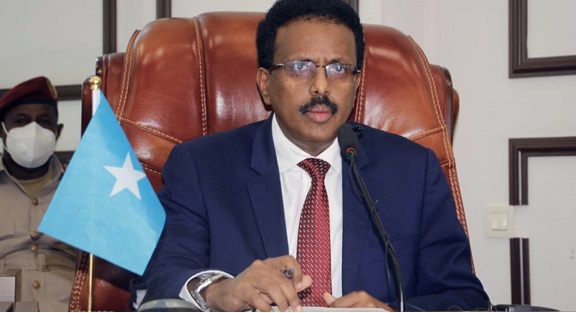By Jonathan Fenton-Harvey, Inside Arabia
As clan militias recently took to Mogadishu’s streets in preparation for battle with government forces, Somalia braced itself for conflict. The tensions began after President Mohamed Abdullahi Mohamed “Farmaajo” attempted to extend his term by two years.

On April 29, the president backtracked on his plans and announced elections would eventually be held, though they were initially scheduled for February 8, per a September 2020 agreement.
“As we have repeatedly stated, we have always been ready to implement timely and peaceful elections in the country,” said Farmaajo in a speech on state television that day.
“But unfortunately, our efforts were hampered by individuals, and foreign entities who have no aim other than to destabilize the country and take it back to the era of division and destruction in order to create a constitutional vacuum,” added the president.
It appears Somalia’s president has succumbed to domestic pressure, as the senate, Prime Minister Mohamed Hussein Roble, some opposition leaders, and four of the country’s six federal member states – including Puntland and Jubaland – rejected his move to extend his term. Condemnation from external powers, including the United States, the European Union, and the African Union, also forced him to think twice.
Then, on May 1, Mogadishu’s Lower House of parliament unanimously voted to hold indirect elections, further raising hopes that the deadlock would break.
Yet, despite President Farmaajo’s announcement of forthcoming elections and the favorable parliament vote, divisions have not subsided, and there is still no clear path towards elections. The president blamed his opponents for politicizing the dispute and accused some security forces of trying to grab power. Fears have risen that Somalia could face a return to the violence that plagued the country after 1991, when strongman Siad Barre’s regime was overthrown.
Indeed, clashes between soldiers loyal to the government and opposition groups erupted on April 25, with some militias taking control of districts in Mogadishu. Gunfire was heard across much of the city, although there were no casualties. A few hundred demonstrators also chanted “We don’t want dictatorship,” as they burned the president’s photo.
“We cannot accept another Siad Barre,” one of the renegading soldiers said.
The UN reported on April 28 that the violence had forced between 60,000 and 100,000 people to flee their homes.
“Apart from displacing innocent civilians, the initial violence has created uncertainty and fear of disruptions of humanitarian assistance to hundreds of thousands of vulnerable people across the city,” said the UN’s acting Humanitarian Coordinator for Somalia, Cesar Arroyo.
However, clashes between rival forces have calmed since Farmaajo’s announcement and will likely continue to subside while talks for a political solution convene.
Read more: Could Somalia Descend into a New Conflict over Presidential Election?
Source: Inside Arabia


